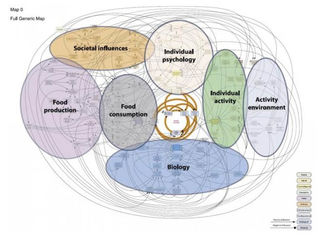Leadership
We Don’t Control Our Weight
Find out what we do control that can help with weight management.
Posted August 22, 2019 Reviewed by Matt Huston
If you’re willing, let’s try an experiment. I’m going to offer you two options, and I’d like you to pick the option that you think sounds more likely to be successful.
Option 1: Tomorrow's weight will be 301 pounds, the day after that it will be 195 pounds, and the following day it will be 255 pounds.
Option 2: Tomorrow, go for a 10-minute walk, the day after that eat two servings of fruit, and the following day drink three glasses of water.
Which option would you be more likely to succeed with? Which option would anyone be more likely to succeed with? If you picked Option 2, you win!
Why would most of us pick Option 2 over Option 1? Option 1 involves an outcome (weight) and Option 2 involves a behavior (doing something). And as humans, we have much more control over our behavior than we do outcomes like weight. In fact, there’s mounting and convincing evidence that we don’t control our weight.
Now, this may seem hard to believe. Everything you've ever heard from the media, from your healthcare providers, from others in your life is that if you just work hard enough, if you just try long enough, you will be able to have a skinny body. But science tells us something different. We can influence our weight but we don’t have direct control.

Weight is actually influenced by more than 50 different processes, many of which we have no control over.
The figure illustrates the factors that influence weight.
For example, weight is influenced by how much sleep you get, the cortisol (stress hormone) levels in your body, how many McDonald’s locations are in your neighborhood, the walkability of your city, your genetics, and your access to fresh fruits and vegetables. Most of these we have no direct control over. How much you eat and how much you exercise are only two small factors in weight.
This also has important implications for how to manage weight. If we focus on weight as the goal, at some point, we will feel like our efforts aren’t getting us to our goal. This is inevitable because we don’t control all the factors that influence weight. And when we feel like our efforts aren’t getting us to our goals, the most normal response is to give up trying and to not bother to try again.
This is an effect called “learned helplessness,” first described by Dr. Martin Seligman and his colleagues: when we feel we have no control, we just stop trying. Many of my patients living with obesity will describe trying over and over and over again to lose weight only to find themselves heavier than when they started. And often I will hear them say “and then I just gave up." That’s learned helplessness. And once learned helplessness sets in it’s hard to undo.
But there is a way we can avoid learned helplessness: by focusing on behavior as a goal instead of weight as a goal. If you try harder to go for a walk, you’re much more likely to go for a walk, but if you try harder to "lose weight" you don’t necessarily lose more weight. In fact, the stress of trying to lose weight may increase the cortisol levels in your body and make it harder to lose weight.
So, if you’re working to manage your weight, think about setting behavioral goals: things that other people can see you do. Examples include going for a walk, eating more fruits and vegetables, drinking more water, eating more whole foods, eating at regular intervals during the day, or tracking your food intake. You’ll be more likely to feel successful and to want to keep going.


